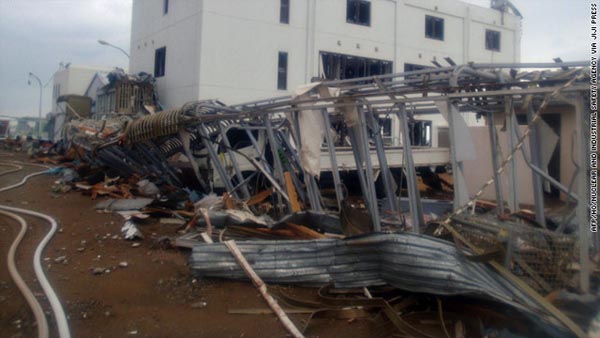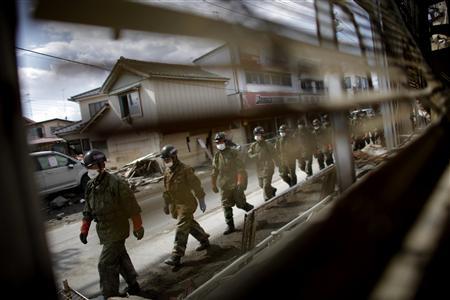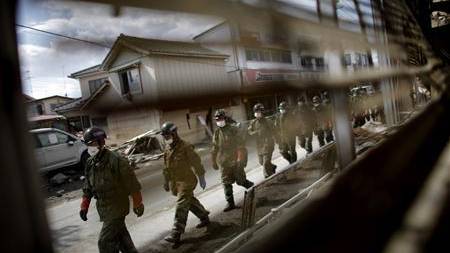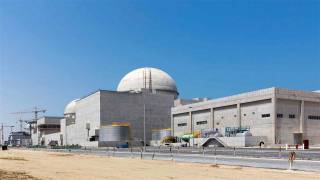Japan stops nuclear plant leak; crisis far from over
Source: montrealgazette.com
Japan stopped highly radioactive water leaking into the sea on Wednesday from a crippled nuclear plant and acknowledged it could have given more information to neighbouring countries about contamination in the ocean.
Despite the breakthrough in plugging the leak at the Fukushima Daiichi power plant, engineers need to pump 11.5 million litres of contaminated water back into the ocean because they have run out of storage space at the facility. The water was used to cool over-heated fuel rods.
Nuclear experts said the damaged reactors were far from being under control almost a month after they were hit by a massive earthquake and tsunami on March 11.
Plant operator Tokyo Electric Power (TEPCO) said it had stemmed the leak using liquid glass at one of the plants six reactors.
"The leaks were slowed yesterday after we injected a mixture of liquid glass and a hardening agent and it has now stopped," a TEPCO spokesman told Reuters.
Engineers had been struggling to stop leaks from reactor No. 2, even using sawdust and newspapers.

Japanese soldiers walk in an area destroyed by the March 11 earthquake and tsunami. Reuters
Neighbours South Korea and China are getting concerned about the world’s worst nuclear disaster since Chernobyl in 1986, and the radioactive water being pumped into the sea, newspapers reported.
"We are instructing the trade and foreign ministries to work better together so that detailed explanations are supplied especially to neighbouring countries," Chief Cabinet Secretary Yukio Edano told a news conference.
Experts insisted the low-level radioactive water to be pumped into the ocean posed no health hazard to people.
"The original amount of radioactivity is very low, and when you dilute this with a huge body of water, the final levels will be even lower than legal limits," said Pradip Deb, senior lecturer in Medical Radiations at the School of Medical Sciences, Royal Melbourne Institute of Technology University.
The government is preparing to revise guidelines for legal radiation levels, designed for brief exposure to high levels of radiation in emergencies and not cumulative absorption, for people living near the damaged plant.
Workers are struggling to restart cooling pumps — which recycle the water — in four damaged reactors.
Until those are fixed, they must pump in water to prevent overheating and meltdowns, but have run out of storage capacity for the seawater when it becomes contaminated.
Radioactive iodine detected in the sea has been recorded at 4,800 times the legal limit, but has since fallen to about 600 times the limit. The water remaining in the reactors has radiation five million times legal limits.
"What they are going to have to release is likely to be highly radioactive. The situation could politically be very ugly in a week," said Murray Jennex at San Diego State University, who specialises in nuclear containment.
Japan’s fishermen, who are part of the politically powerful agriculatural lobby, made it clear they were not assuaged by assurances that ocean radioactivity levels were low and safe.
"(The release of radioactive water into the sea) is unforgivable in any circumstance," Ikuhiro Hattori, chairman of the Japan Fisheries Cooperatives, told NHK state television.
"From now on, our fishermen will never co-operate with or accept nuclear power generation. I would like them to stop even those reactors that are now in operation right away."
Liquid glass stops leaks at Fukushima
Video from: YouTube.com
COOLING REACTORS KEY
Japan is facing its worst crisis since World War Two after the 9.0 magnitude earthquake and tsunami left nearly 28,000 people dead or missing and thousands homeless, and rocked the world’s third-largest economy.
It will likely take months to finally cool down the reactors and years to dismantle those that have been damaged. TEPCO has said it will decommission four of the six reactors.
An opposition lawmaker from Fukushima told reporters antipathy in the area would make it difficult to resume operations at the nearby Fukushima Daini plant, where operations have been halted since March 11.
The two Fukushima plants together provide four per cent of Japan’s electric power.
"Nuclear power plants can run only with local consent. I see it as being quite difficult to resume operations," said Masayoshi Yoshino of the Liberal Democratic Party.
Concerned over a possible buildup of hydrogen gas in reactor No. 1, engineers will inject nitrogen gas into the reactor on Wednesday night to prevent an explosion, TEPCO said.
Hydrogen explosions ripped through reactors 1 and 3 early in the crisis, spreading high levels of radiation into the air.
The key to bringing the reactors under control is the extent of damage to the plant’s cooling system, said analysts.
In a sign the cooling systems may be severely damaged, the Sankei newspaper reported that the government and TEPCO were considering building new cooling systems for three reactors to operate from outside the reactor buildings.
"To put the Fukushima nuclear catastrophe in perspective, Chernobyl involved a single operating reactor core," said Kevin Kamps from Beyond Nuclear, a U.S. radioactive waste watchdog.
"Fukushima Daiichi now involves three reactors in various stages of meltdown and containment breach, and multiple (spent fuel storage) pools at risk of fire," said Kamps.
Kamps said the spent fuel rod pools, which are on the roof of the damaged reactors, alone have more irradiated nuclear fuel than that which exploded and burned at Chernobyl.
Article from: montrealgazette.com






















